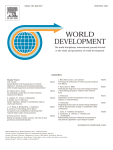What is the role of Information and Communication Technology in the collective management of public bads? We study epidemics of late blight in potato as a collective action challenge in Oromia, Ethiopia. As a highly infectious, air-borne disease, potato late blight represents a public bad: it is non-excludable and non-rival. Managing public bads is a major policy challenge in Ethiopia due to structural inefficiencies and resource constraints to formal interventions. Dispersed rural farmers lack capacity and infrastructure to maintain communication flows that are key for effective collective action. We introduce an experimental, framed, public bads game where randomly selected groups of potato farmers are presented with a collective action dilemma whether to invest in a joint initiative to control late blight (fungicide spraying) or to suffer productivity loss if the threshold is missed. We also manipulate the ICT-mediated communication variable by providing access to a smartphone-based group communicator to a random sub-sample of the participants. We find that collective action problems do occur and participants tend to free-ride on the efforts of others. We show that ICT-mediated communication has a statistically significant positive effect on cooperative behavior, disease control, returns on investment and game winnings. Our qualitative analysis of the voice chats provides evidence that farmers use ICT to: (1) facilitate complex coordination, (2) establish collective norms, (3) detect and pressure ‘free riders’, and (4) manage reputation to increase trust. This paper complements the existing literature on public bads by studying real-life stakeholders in a real-life collective action challenge. It contributes to the literature on the contested topic of ‘ICTrevolution’ and its supposed transforming effect on African agriculture. From the point of view of policy, we draw attention to the pivotal importance of improving communication infrastructure in rural regions of Ethiopia, and the opportunities to scale collective action interventions through ICT.
The role of ICT in Collective management of Public Bads: The case of Potato late blight in Ethiopia
Citation: Cieslik, K., Cecchi, F., Assefa Damtew, E., Tafesse, S., Struik, P. C., Lemaga, B., Leeuwis, C. (2021). The role of ICT in Collective management of Public Bads: The case of Potato late blight in Ethiopia. World Development, 140, 105366.
2021-02-11
CLIMATE-SMART AGRICULTURE, CROP AND SYSTEMS SCIENCES CSS, CROP PROTECTION, POTATO AGRI-FOOD SYSTEMS, POTATOES
Eastern Africa
ETHIOPIA
journal_article

